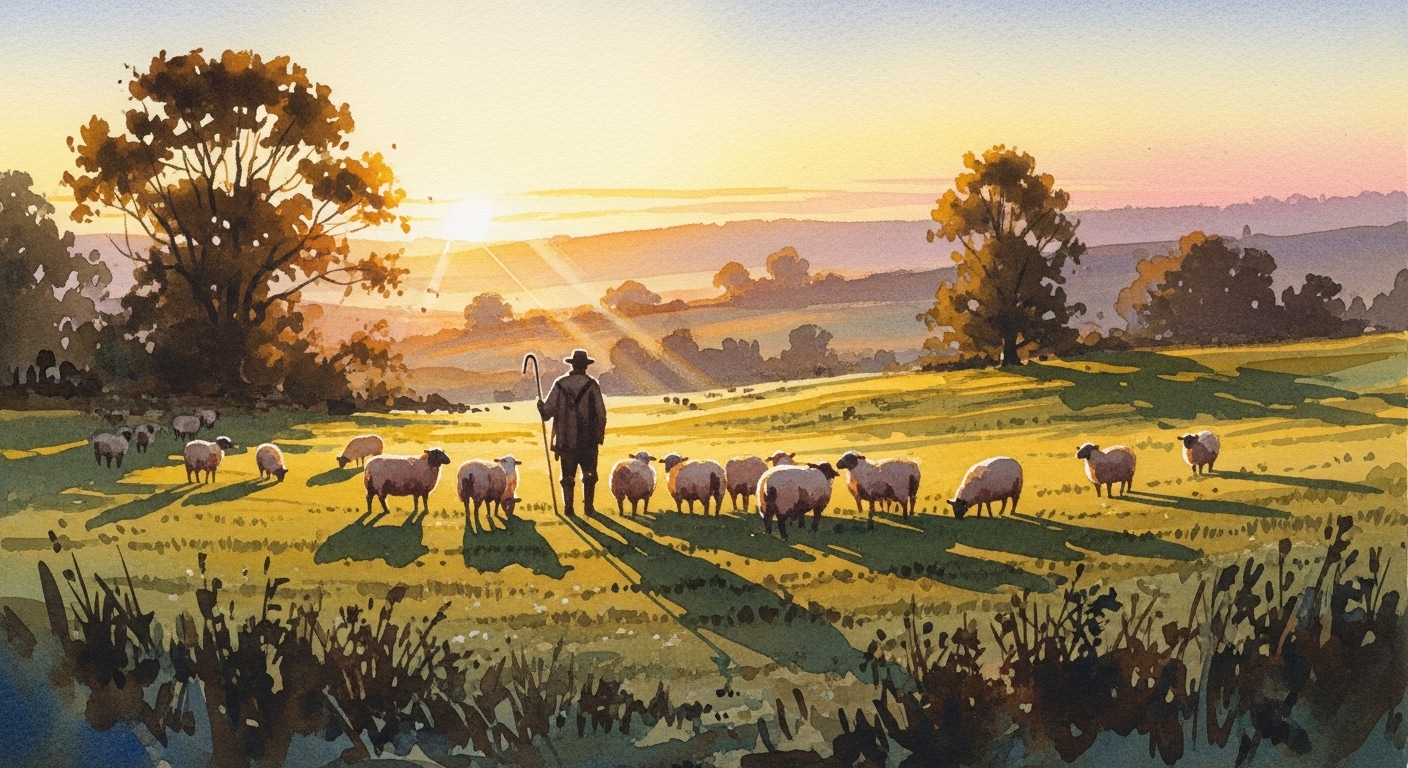Reflecting On Psalm 23: Finding Comfort In The Shepherd’s Care
Psalm 23 reflection invites you into a quiet place where ancient words meet your present life. You’ve probably heard this psalm at funerals, weddings, or quiet mornings, but taking time for a deeper Psalm 23 reflection can change how you live day to day. In this article, you’ll walk through the psalm verse by verse, explore its themes, and discover practical ways to let the Shepherd’s care shape your decisions, rest, and resilience.
Why Psalm 23 still matters for you
Psalm 23 reflection matters because this short poem addresses the basic longings of the human heart: safety, provision, guidance, restoration, and companionship. Whether you’re confident in faith or asking difficult questions, these twelve lines speak to the rhythms of life—work, worry, rest, loss, and hope. The imagery of a shepherd caring for sheep is simple, earthy, and accessible, so you can relate even if you’ve never been around sheep. As you read and reflect, you’ll notice how the psalm moves from peaceful provision to steady presence even in danger, which mirrors the human experience of moving between calm and crisis.
A quick look at the text
Reading the text slowly helps you hear its cadence and notice details you might have missed. Take a moment to read the psalm in your Bible or online: Psalm 23:1-6. Let the words sink in before you continue your Psalm 23 reflection.
Context: who wrote it and why it matters
Psalm 23 reflection also benefits from a little background. Tradition attributes this psalm to David, himself a shepherd in his youth and later a king, which explains the authenticity of the shepherd imagery. Knowing the author helps you see the psalm as not just poetic language but lived experience. David’s life included both quiet shepherding and high-stakes leadership, so when he writes about a shepherd’s care, he’s drawing on real knowledge of dependence, danger, and deliverance. This historical layer gives the psalm practical authority and emotional resonance, which you can hold onto in your own seasons of uncertainty.
Verse-by-verse Psalm 23 reflection
Verse 1 — The Lord is my shepherd; I shall not want
Start your Psalm 23 reflection with the opening promise. Psalm 23:1 states a relationship first: the Lord is your shepherd. That’s personal and relational, not transactional. When you read “I shall not want,” it doesn’t mean you’ll never have needs or desires; rather, it declares a fundamental sufficiency rooted in relationship. In practical terms, this verse invites you to posture your heart toward trust. When want press in—money, acceptance, security—remind yourself that a shepherd is actively involved in your welfare. Your rest and contentment begin with identity: you belong to a Shepherd who provides.
Verse 2 — He makes me lie down in green pastures; he leads me beside still waters
As part of your Psalm 23 reflection, notice how rest and nourishment are central. Psalm 23:2 paints a picture of provision that goes beyond food—green pastures and still waters are places of refreshment for body and soul. If you’re exhausted, this image reassures you that rest is part of the good life, not a luxury. The shepherd leads; you don’t need to hustle your way into restoration alone. This verse also challenges the culture of productivity by reminding you that being led to rest is an act of care, not indolence.
Verse 3 — He restores my soul. He leads me in paths of righteousness for his name’s sake
Your Psalm 23 reflection will deepen when you connect restoration to direction. Psalm 23:3 says the Shepherd restores your soul and leads you in right paths. Restoration implies repair—wounds are healed, energy is renewed, and clarity returns. Pathways of righteousness point to moral and spiritual direction, not mere rule-following. When the Shepherd leads you, your choices align with a life that reflects his character. Notice the motivation: “for his name’s sake.” Your flourishing brings honor to the Shepherd, but it’s rooted in his character, not in your performance.

Verse 4 — Even though I walk through the valley of the shadow of death, I will fear no evil
This verse is often the heart of many Psalm 23 reflections because it addresses fear. Psalm 23:4 doesn’t promise you won’t face dark valleys; it promises you won’t face them alone. Even when circumstances feel threatening—loss, illness, failure—the Shepherd’s presence gives courage. The “rod and staff” mentioned in the verse symbolize protection and guidance. When fear rises, your response can shift from anxiety to companionship: “You are with me.” That simple acknowledgment changes your posture toward trials.
Verse 5 — You prepare a table before me in the presence of my enemies
In your Psalm 23 reflection, this image of a prepared table is rich and surprising. Psalm 23:5 suggests honor and provision even amid opposition. The Shepherd not only protects you from danger; he dignifies you before those who would harm or shame you. Anointing your head with oil symbolizes blessing and chosen status. An overflowing cup points to abundance. This verse encourages you to trust that God’s care includes dignity and celebration, not just survival.
Verse 6 — Surely goodness and mercy shall follow me all the days of my life
Finish your Psalm 23 reflection with hope. Psalm 23:6 promises that goodness and mercy will follow you continually. The psalm ends on a forward-looking note: dwelling in the house of the Lord forever. Your future is not left to chance; it’s shaped by a Shepherd whose goodness pursues you. This is not mere sentimentality but a powerful assurance that anchors your outlook in both present comfort and eternal hope.
Themes to carry into your daily life
Provision: you are cared for
A key theme in your Psalm 23 reflection is provision. The shepherd imagery emphasizes that your needs—physical, emotional, spiritual—are noticed and met. When you face scarcity or fear, recall Psalm 23:1-2 to reorient your trust. Provision may not always match your timeline, but the promise encourages patience and gratefulness, which transform how you live and give in the present.
Rest and restoration: permission to stop striving
Another theme is rest. Your culture pressures you to produce, but Psalm 23:2-3 permits you to be led into rest and to receive restoration. Make this practical: schedule Sabbath rhythms, quiet retreats, or daily pauses. Rest is an act of faith that the Shepherd is working even when you’re still.
Guidance: You don’t have to wander alone
Guidance is at the center of your Psalm 23 reflection. The shepherd leads; he doesn’t force. Psalm 23:3 models a leadership that directs for your well-being. When you face decisions, seek ways to discern direction—prayer, counsel, Scripture, and wise friends. Remember that leadership from the Shepherd always aims for your flourishing.
Presence in trial: courage without illusion
Your Psalm 23 reflection should also account for suffering. Psalm 23:4 doesn’t remove valleys; it promises presence. This is crucial because many spiritualities promise pain-free living, which can leave you devastated when hardship arrives. Instead, this psalm offers a steady companion in trial, giving you courage to face reality honestly.
Honor and abundance: celebration amid conflict
The table prepared and the anointing in Psalm 23:5 show that God’s care includes dignity and abundance. Even in conflict or shame, you are invited to a place of blessing. This theme can reshape your response to opposition—rather than shrinking, you can receive and display the Shepherd’s generosity.
Hope and continuity: a life shaped by goodness and mercy
Finally, your Psalm 23 reflection should end with the promise of future belonging. Psalm 23:6 points to ongoing goodness and the promise of dwelling in God’s presence. This continuity turns ephemeral comforts into something anchored in a larger story, so your daily life participates in an enduring promise.
How the Shepherd imagery helps you understand Jesus
Your Psalm 23 reflection gains new layers when you read it through the lens of the New Testament. Jesus explicitly identifies himself as the Good Shepherd, offering his life for the flock. See John 10:11, where Jesus says, “I am the good shepherd. The good shepherd lays down his life for the sheep.” That claim reframes Psalm 23: the Shepherd’s care is not distant or abstract; in Jesus, it’s personal, sacrificial, and redemptive. When you struggle to trust, you can meditate on the fact that the Shepherd walked the way of service and self-giving.

Practical applications: How to live out your Psalm 23 reflection
Cultivate a daily practice of dependence
Turn your Psalm 23 reflection into daily rhythms. Start mornings by repeating lines from the psalm as prayer—“The Lord is my shepherd; I shall not want.” This short practice reorients your heart toward trust before the day’s demands shape you.
Create physical spaces of rest
Use the shepherd’s invitation to rest by crafting spaces—literal or scheduled—where you can be refreshed. It might be a quiet corner at home, a daily 15-minute walk, or a weekly afternoon that’s free of work obligations. When you protect these spaces, you learn that rest is part of faithfulness, not escapism.
Practice gratitude for the provision
Make a habit of listing what the Shepherd has provided—food, relationships, safety, spiritual growth. Gratitude trains you to see provision when it comes and to trust during lack. Gratitude anchors your Psalm 23 reflection in concrete memory, not just hopeful thinking.
Seek guidance in the community
When you need direction, don’t try to go it alone. Talk with trusted friends, mentors, or spiritual leaders who can reflect the Shepherd’s guidance through wise counsel. Community acts as a practical extension of the Shepherd’s rod and staff—protecting and guiding you along the path.
Face your valleys with prepared resources
Anticipate that valleys will come and prepare practical resources: a counselor, a supportive friend, spiritual practices, and healthcare when needed. Create a “valley plan” so you don’t have to make decisions in panic. A prepared heart finds courage more easily in the dark.
Celebrate and bless others
If the Shepherd prepares a table for you, part of your Psalm 23 reflection is to open the table for others. Host meals, offer blessings, and advocate for dignity for those who are marginalized. Celebration is a visible way to live out the abundance you’ve received.
Questions for your personal reflection and journaling
Use these prompts to deepen your Psalm 23 reflection. Spend time writing or meditating on them.
- When do you most feel like you “shall not want,” and when do you struggle with want?
- What kinds of rest restore you? What keeps you from taking them?
- Where have you experienced the Shepherd’s guidance recently?
- What valley are you in or might you be approaching, and who can accompany you?
- How can you offer a prepared table to someone else this month?
Each question nudges you from abstract appreciation to concrete change. Allow your answers to guide practical steps you can take this week.
How Psalm 23 shapes pastoral care and community life
Your Psalm 23 reflection isn’t only personal; it shapes how you care for others. Pastors and leaders draw on the psalm when comforting grieving families, guiding the anxious, or teaching about God’s presence. In community life, Psalm 23 becomes a shared language of hope that you can use in prayer groups, counseling sessions, and worship to affirm God’s ongoing care. When you bring this psalm into community contexts, it moves from private consolation to public witness.
Common misreadings to watch for
As you continue your Psalm 23 reflection, avoid a few traps. Don’t turn the Shepherd into a vending machine that exists to meet every demand on your timetable. Also avoid sentimentalizing the psalm so that it loses its raw honesty about valleys and fear. The balance is to hold both assurance and realism—God’s presence does not always prevent pain, but it transforms how you experience it.
Bringing Psalm 23 reflection into difficult seasons
When you’re in grief, illness, or uncertainty, Psalm 23 reflection can be both balm and challenge. Balm because it reminds you of presence and care; challenge because it may force you to lament honestly in front of God. Lament is part of trust: bringing your confusion, anger, and sorrow to the Shepherd enlarges the space where healing begins. Use the psalm as a structure: state your need, name the Shepherd’s presence, and claim hope even amid pain.
Psalm 23 reflection across cultures and eras
The enduring power of Psalm 23 comes from its universality. Across centuries and cultures, people have turned to this psalm for comfort and identity. In hospitals, battlefields, prisons, and homes, the image of a caring Shepherd translates across social and linguistic barriers. Recognize this when you share the psalm: it meets people where they are and invites a response that’s both ancient and immediate.
Meditation practice using Psalm 23
Try a guided meditation as part of your Psalm 23 reflection. Sit quietly, breathe slowly, and read one verse aloud. Pause, imagining the scene—the green pasture, the still water, the prepared table. Notice what feelings arise. If fear comes, speak the words of the verse aloud: “You are with me.” If gratitude appears, let it move you to praise. Repeat this for a few minutes each day for a week and note how your awareness of God’s care shifts.
Artistic and liturgical uses of Psalm 23 reflection
Artists and worshipers have long used Psalm 23 in music, painting, and liturgy because its images are vivid and portable. You can deepen your Psalm 23 reflection by engaging creatively: paint the shepherd’s path, write a poem responding to a verse, or compose a short prayer that captures your current trust and need. Creative practices embody the psalm’s truths in ways that intellectual reflection alone cannot.
The Shepherd’s care in leadership and ethics
Your Psalm 23 reflection has implications for leadership. A shepherd-leader prioritizes the well-being of those in their care, provides guidance rather than coercion, and models humility. If you’re in a leadership position—at work, home, or church—let the psalm inform your ethic: protect the vulnerable, lead toward flourishing, and offer spaces of rest and restoration for those you oversee.
Resources to continue your Psalm 23 reflection
To continue your study, read commentaries and sermons that explain the psalm’s language and theology. For example, you can compare translations or consult resources on Bible Gateway like Psalm 23:1-6 for different versions and study notes. Also consider New Testament connections such as John 10:11, which deepens the Shepherd theme through Jesus’ teachings. Regular reading of the psalm in different seasons will reveal new shades of meaning.
A short guided prayer based on Psalm 23
Use this simple prayer as a launching point for your Psalm 23 reflection. Speak or think these lines in your own words:
- Shepherd, you are mine—teach me to trust your provision.
- Lead me into rest and refresh my tired soul.
- Guide my steps in paths of righteousness for your name’s sake.
- Be with me in every valley; let me fear no evil.
- Prepare a table for me and anoint me with your blessing.
- Let your goodness and mercy follow me all the days of my life.
Pray this prayer when you need to re-center, and let its phrases shape your posture toward God.
Final thoughts on Psalm 23 reflection
As you conclude your Psalm 23 reflection, remember that the psalm is an invitation more than a magic formula. It invites you to a relationship with a Shepherd who provides, leads, protects, honors, and pursues you with goodness. Let the psalm shape how you rest, decide, mourn, celebrate, and lead. Over time, this reflection can move from an occasional devotional to a way of life—one defined by trust, presence, and hope.
Explore More
For further reading and encouragement, check out these posts:
👉 7 Bible Verses About Faith in Hard Times
👉 Job’s Faith: What We Can Learn From His Trials
👉 How To Trust God When Everything Falls Apart
👉 Why God Allows Suffering – A Biblical Perspective
👉 Faith Over Fear: How To Stand Strong In Uncertain Seasons
👉 How To Encourage Someone Struggling With Their Faith
👉 5 Prayers for Strength When You’re Feeling Weak

📘 Jesus and the Woman Caught in Adultery – Grace and Mercy Over Judgement
A powerful retelling of John 8:1-11. This book brings to life the depth of forgiveness, mercy, and God’s unwavering love.
👉 Check it now on Amazon 🛒💥
🔥 “Every great message deserves a home online.” 🌍💬🏡
Don’t let your calling stay hidden. Start a Christian blog or website using Hostinger — with 99.9% uptime, a free domain, and SSL, your voice can shine for God’s glory anytime, anywhere.
💥 Begin today. 🛒 Try it RISK-FREE! ✅
✝️ “Your body is God’s temple — care for it with purpose.” 💪💖🏛️
Renew your energy and restore balance naturally. Mitolyn helps support a healthy metabolism, giving you the vitality to live out God’s calling with strength and confidence.
🔥 Unlock Your Metabolic Power! ⚡Burn More Calories & Feel Great With Mitolyn. 💪
👉 Start Today. 🚀 Check Price Now. 🛒💰
💰 As a ClickBank & Amazon Affiliate, I earn from qualifying purchases.
📖 Acknowledgment: All Bible verses referenced in this article were accessed via Bible Gateway (or Bible Hub).
🚀 Want to explore more? 👉 Dive into our new post on Why Jesus? and experience the 🔥 life-changing truth of the Gospel!




